General
Well I was hoping to do more posts about WCEF sooner but they were packed days with mostly 10-minute sessions. We didn't even get a lunch break and Monday ran late until 8pm. Speakers were blasting through their slides, and most of them were getting kicked off stage before finishing. A good number had issues where their slides weren't displayed until almost the end of their presentation which is annoying for everyone. I could barely keep up making written notes and it was hard to follow while writing anyway. There was almost never a time for questions, even during the panels and that was a real shame. I know they had a LOT of people, mostly ICOs making pitches that wanted to present and probably paid good $ or $Crypto to do so, but it really crowded out the more general stuff. I think they should have a track with 100% ICO pitches all the time. I also missed a bunch of things because they were in different tracks and the tracks were running late and out of sync so it was impossible to figure out where to be. I found out later that everything was being recorded and would be on YouTube later. That said I think then they should have had more tracks with longer sessions (like 20 minutes and 5 minutes for Q&A plus 5 minutes to relocate rooms on each. The less important stuff I'd watch later from the recording.
Content
They had general and ICO issue focused tracks the first day, and then app markets and technical tracks the second. I spent most of my time in the general session the first day, most of the time in the second. I'd say a good 50% of presentations were very interesting, maybe 10% of low quality, poorly produced, or not too relevant, they rest were somewhere in between.
People
There was a fair mix - a lot of people actually doing ICOs, a lot of investors - I'd say many where people who had crypto wealth to churn back into the market. There was an exhibit room with maybe 20 ICOs and companies presenting their wares. There was a pretty high level of technical knowledge among all those people unlike a lot of tech conferences where you have a lot of marketing drones there to scan your badge, get you a presentation and move you one. I was able to have some pretty in-depth conversations about technology, economics and such. And I was able to catch up with a few local people in the biz I knew who were attending. If you are a strong networker I think you'd probably make some great connections.
There were also a lot of crypto-anarchists and libertarians of course. Some speakers got quite emotional in their proclamations about tearing down archaic and broken systems and rent-seeking middle-men. I managed to start some applause for one such outburst. It was pretty clear where the majorities interests lay even if we certainly had some people from those soon to be confronted industries present.
Presentations
There were way too many to talk about in depth - I'm going to do a summary in the next post with a few things that caught my eye, but I'll call out two sessions that I really enjoyed...
Best presentation - Hub
I was very excited when I happened to catch Eric Ly, co-founder of LinkedIn presenting about his new project Hub. Hub creates what they call a decentralized Human Trust Protocol and it's goal is to create:
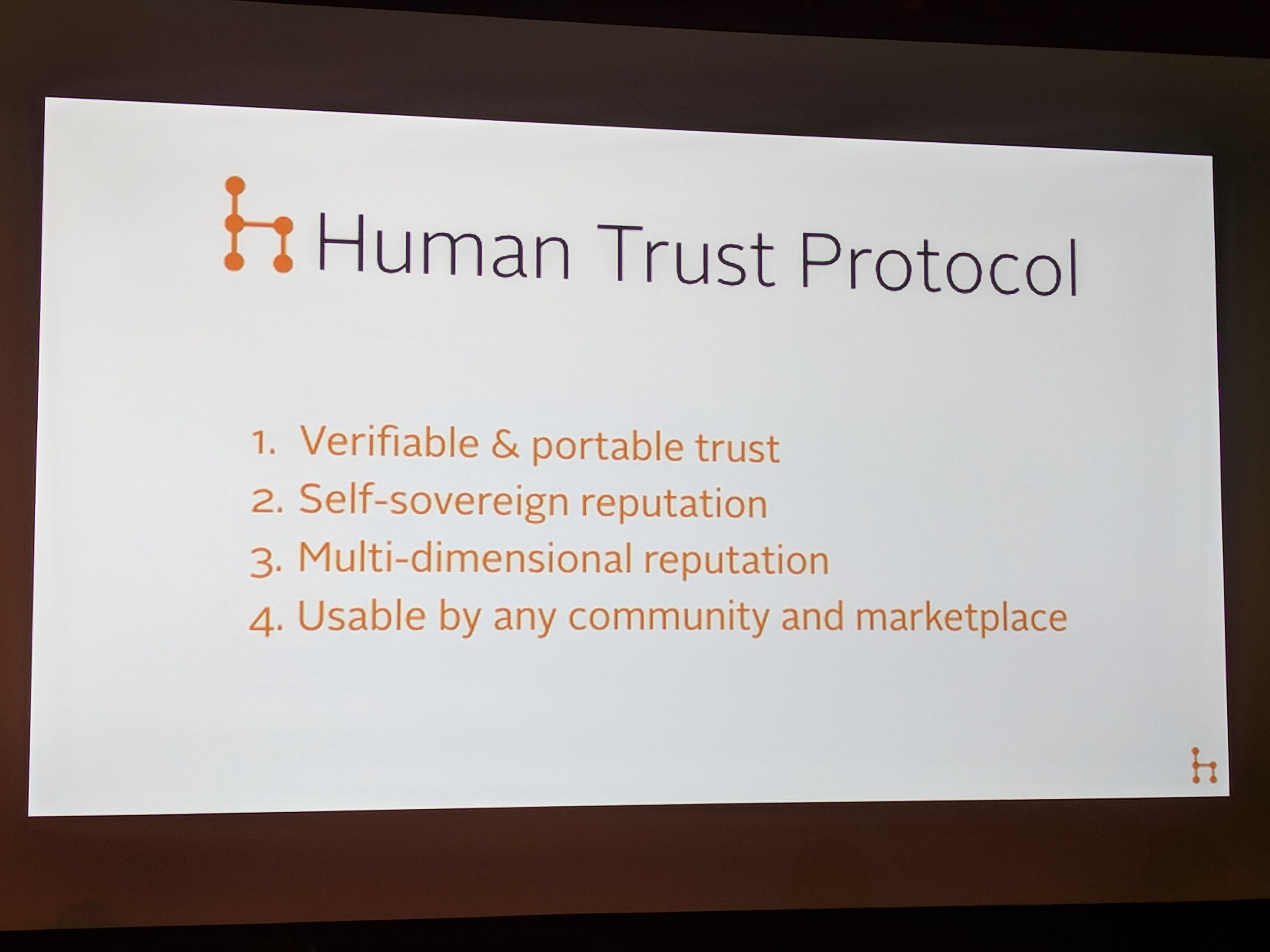
- Verifiable and portable trust - real-world entities can verify the data
- Self-sovereign reputation - you own the data and control who can access it
- Multi-dimensional reputation - it's more than just a single number
- Usable by any community and marketplace - embed it in many apps
Basically, think of all the information the LinkedIn has that connects you to other people, and think about how little you know about random third parties who want to connect with you on LinkedIn. Now put all the information about you on a blockchain but let you control who can access it to determine your "trustworthiness". That could be anything from financial if you're looking for a loan - that's a strong overlap with Bloom, or it could be if you're someone who can be trusted when renting with AirBnB, when dating, or if you're a good employee or contractor, or a good "expert" on some topic. Then let you use your identity and take it anywhere you want controlling how much of it is accessible to the places you take it. This is something other centralized web-based services have tried to do before and failed, but I'd be excited to see it succeed as the world really needs this.
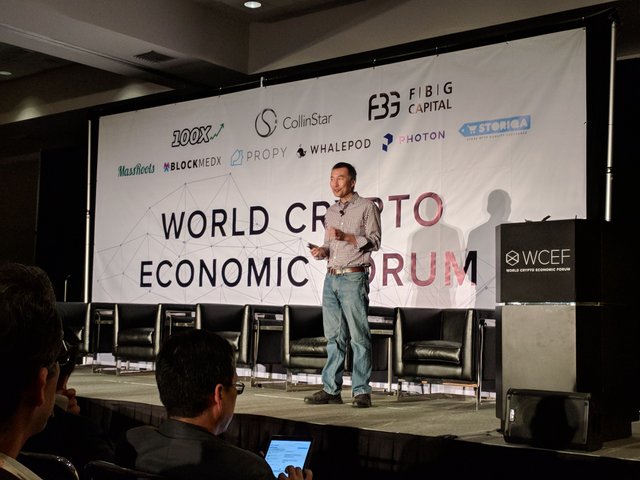
Eric Ly presents Hub Token
Best panel - Vice
This was a pretty interesting one because I've been following the vice space for quiet a while. The three panelists represented drug, sex, and gambling industries. They all talked about how hard it is to get financial services for companies these spaces even when 100% legal in the jurisdictions they operate in. This can lead to, for example, people distributing cannabis having to accept bags full of money in return and then getting robbed. Or sex workers having to deal with mostly anonymous clientel who might try to rip them off or even worse. Or gamblers who get ripped off by illegitimate online casinos.
The panelists all detailed how they have been able to overcome many issues using the blockchain to provide payment, identity or reputation, and transparency. Their biggest problems are dealing with red-tape getting things set up and user adoption. However it was refereshing to see people applying blockchain to problems that just cannot easily be solved in other ways and actually creating real apps being used by real people. Never underestimate the power of vice to push a technology forward!
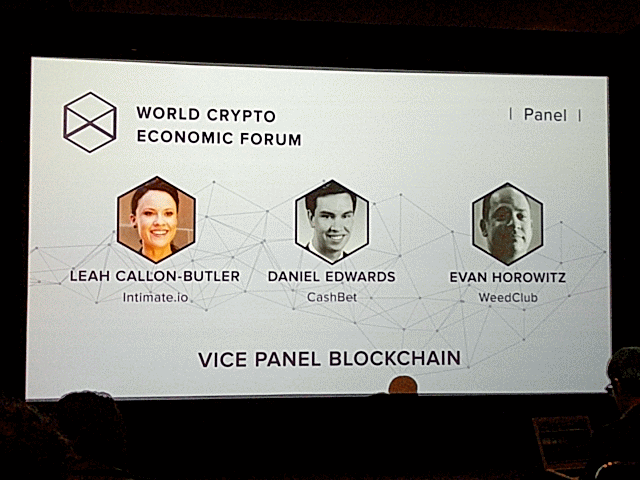

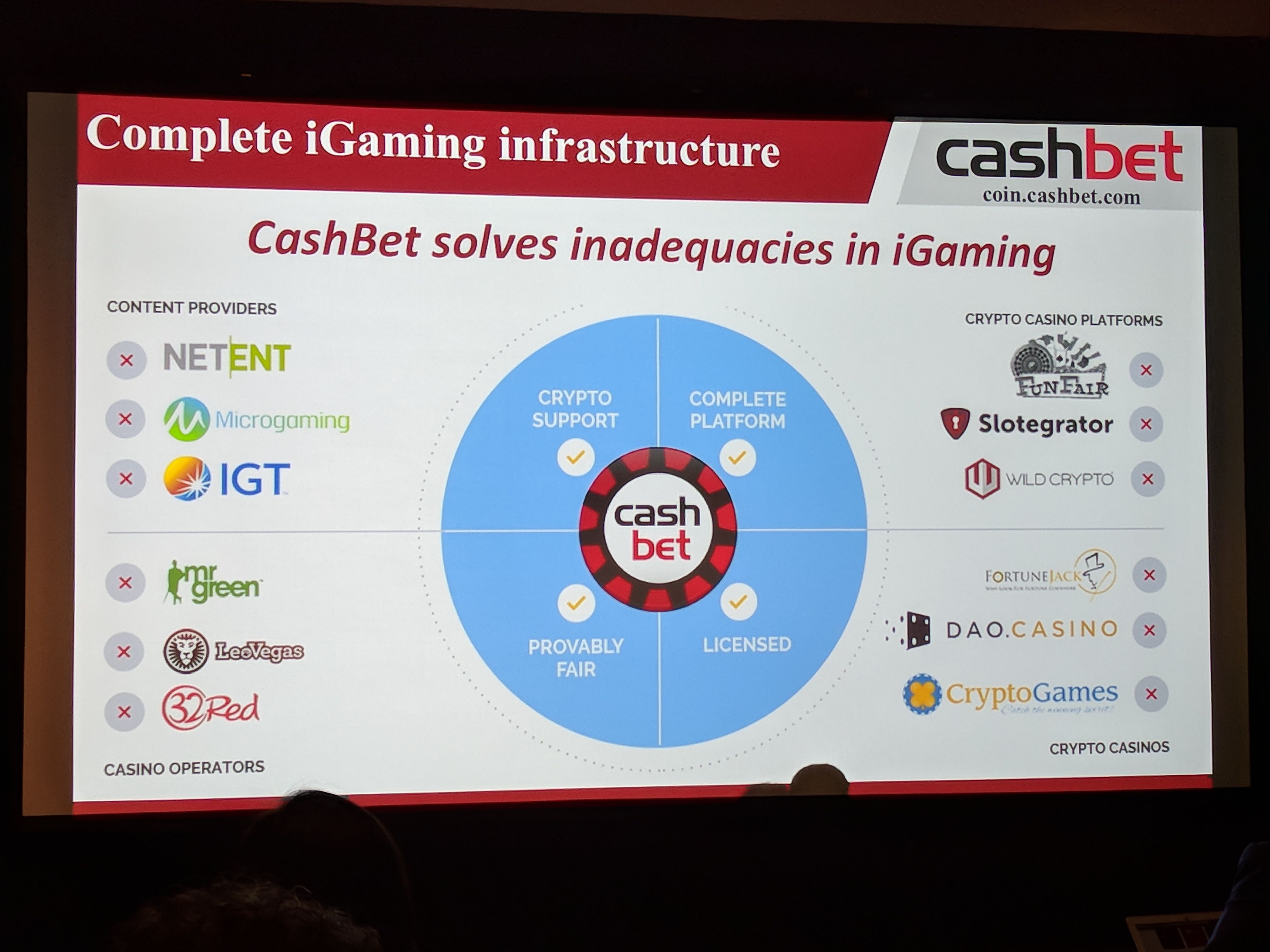
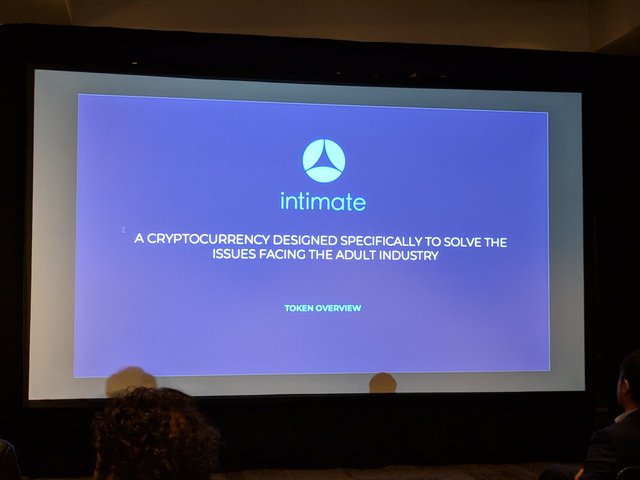
Nice to be your friend here at Steemit.I already followed you to see all of your future blogs!The community needs cool people like you :-)
I wish you more followers and friends!Don't forget to follow and upvote me too @laique so that we can be friends forever :D
Downvoting a post can decrease pending rewards and make it less visible. Common reasons:
Submit
what do you think about sbd and steam prices are opposite each other?
Downvoting a post can decrease pending rewards and make it less visible. Common reasons:
Submit
Right now they are pretty much the same. SBD is supposed to be $1 but my understanding is $1 is the minimum. However because there is a very limited supply of SBD - I head only about $3M worth - then when a lot of people are wanting to buy or be rewarded in SBD for their Steemit activities it drives the price up. That's the law of supply and demand. But if everyone sells all their SBD - there's a pool of 3 million US dollars available to buy them back at $1 each.
This is of course highly confusing for users of Steemit. But the intent is that built into the platform you can elect to receive payment in 50% SBD, or sell STEEM for SBD and SBD will never be worth less than $1 even if STEEM crashes to almost zero (it was $0.50 not too long ago).
I think what needs to happen is that a much larger reserve of USD needs to be created so more SBD can be created. That will drive the price down to closer to $1. Maybe 10x what we have now.
Downvoting a post can decrease pending rewards and make it less visible. Common reasons:
Submit
Educative post,thanks for sharing.
Downvoting a post can decrease pending rewards and make it less visible. Common reasons:
Submit
Nice presentation & good read...keep it up 😍
Downvoting a post can decrease pending rewards and make it less visible. Common reasons:
Submit
Hi! I'm one of WCEF organizers. I understand your point about short talks but they might have been boring if they were longer :) Thanks for coming to the event and sharing this!
Downvoting a post can decrease pending rewards and make it less visible. Common reasons:
Submit